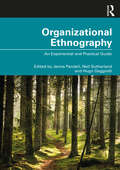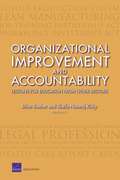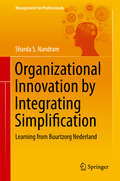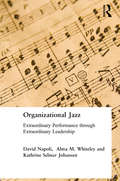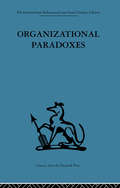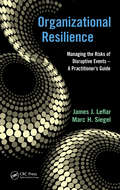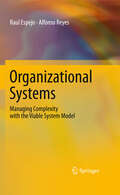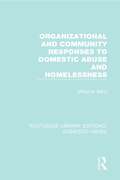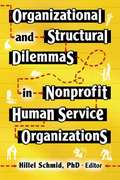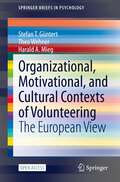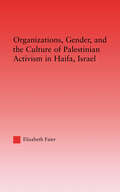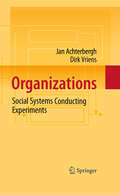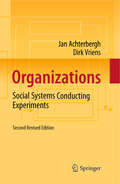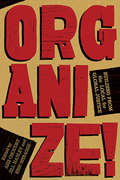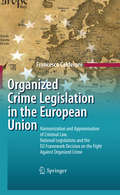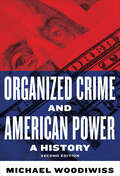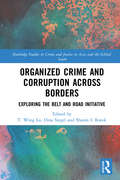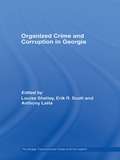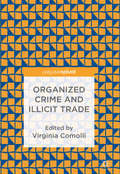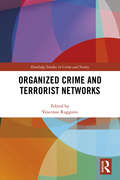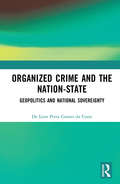- Table View
- List View
Organizational Ethnography: An Experiential and Practical Guide
by Jenna PandeliThis textbook explores practices, first-hand experiences and emerging ideas within organizational ethnography, providing a toolkit that prepares ethnographers for the uncertainties and realities of fieldworking. Students faced with the complexities of qualitative observational techniques and considerations, such as the scope of the research, the personal and professional intertwined life of the qualitative research or the decision of when to leave the field, will find the book an extremely useful, practical guide. A range of experiences from a variety of academics at different stages of their career, to highlight the differences in practices, approaches and encounters, are presented. The themes of the individual chapters cover three main areas: aspects to consider and reflect on before undertaking an ethnography, the process and experiences of conducting ethnographic work and considerations for after the fieldwork. Particular attention is given to appreciating the complexity and practicalities of ethnographic work, providing a more experience-driven text, and understanding perspectives from a range of different approaches to organizational ethnography. This book should be a recommended text for advanced undergraduate and postgraduate students studying research methods within Business and Management. It is particularly important for all students and academics undertaking qualitative research, especially ethnography.
Organizational Ethnography: Studying the Complexity of Everyday Life
by Sierk Ybema Dvora Yanow Harry Wels Frans H. KamsteegJust as newspapers do not, typically, engage with the ordinary experiences of people's daily lives, so organizational studies has also tended largely to ignore the humdrum, everyday experiences of people working in organizations. However, ethnographic approaches provide in-depth and up-close understandings of how the 'everyday-ness' of work is organized and how, in turn, work itself organizes people and the societies they inhabit. Organizational Ethnography brings contributions from leading scholars in organizational studies that serve to unpack an ethnographic perspective on organizations and organizational research. The authors explore the particular problems faced by organizational ethnographers, including:<P> - questions of gaining access to research sites within organizations;<P> - the many styles of writing organizational ethnography;<P> - the role of friendship relations in the field;<P> - problems of distance and closeness; <P> - the doing of at-home ethnography;<P> - ethical issues; <P> - standards for evaluating ethnographic work.<P> This book is a vital resource for organizational scholars and students doing or writing ethnography in the fields of business and management, public administration, education, health care, social work, or any related field in which organizations play a role.
Organizational Improvement and Accountability
by Brian M. Stecher Sheila Nataraj Kirby Heather Barney Marc Chow Marjorie L. PearsonExamines five accountability models--two from the manufacturing sector; a performance incentive model used in the evaluation of job training programs for the poor; accountability in the legal sector; and accountability in health care as shown by clinical practice guidelines, use of statistical risk-adjustment methods, and the public reporting of health performance measures. The authors summarize the models' effectiveness and draw lessons for implementing the No Child Left Behind Act.
Organizational Innovation by Integrating Simplification
by Sharda S. NandramThis book presents the theory of integrating implification and it provides a profound evidence based study of Buurtzorg Nederland. The case itself, forming the building block of the theory, has received tremendous interest in the Netherlands and abroad. This is the first international book on Buurtzorg Nederland and the first one departing from a management multidisciplinary perspective. The book demonstrates theory building by using the Grounded Theory Methodology as a way to contribute to management theory. Integrating simplification gives room for context specific implementation of organizational innovation to different industries.
Organizational Jazz: Extraordinary Performance through Extraordinary Leadership
by David Napoli Alma Whiteley Johansen S KathrineIt is obvious that the world is caught in the process of constant, rapid and unpredictable change. Such changes are challenging the time-honoured business models that we hold, as we strive to understand the changes around us and survive. This book offers a lens through which we search for new ways of thinking about, and working in our dynamic complex world. The search draws on the science of complex adaptive systems. Organizations of today need ‘Extraordinary Leaders’ who can ‘dance’ with these changes by embracing the principles of complexity science to create highly adaptable and innovative organizations that recognise the value of intangible assets. The success of an organization usually depends on those working closest to the value-adding end of the business. It is those employees and their immediate leaders, who seem to have the greatest impact on the success of an organization. Managers-as-leaders can ease the way for those who depend on them for support and encouragement. People are the only true agents in a business or organization. All assets, whether tangible or intangible, are the result of human actions. Therefore, it is essential that people in organizations experience high levels of commitment to their work and value relationships and respect. These are fundamental requirements if rapid, timely and comprehensive information is to flow to the decision points within the organization in productive and sustainable ways. This book places people at the centre of the organization working within the theoretical framework of complex adaptive systems and shows how and why it works to create wealth and dignity. Organizational Jazz symbolically represents the joining of the certain with the uncertain creating an environment for innovation and performance.
Organizational Paradoxes: Clinical approaches to management
by Manfred F R Kets de VriesTavistock Press was established as a co-operative venture between the Tavistock Institute and Routledge & Kegan Paul (RKP) in the 1950s to produce a series of major contributions across the social sciences. This volume is part of a 2001 reissue of a selection of those important works which have since gone out of print, or are difficult to locate. Published by Routledge, 112 volumes in total are being brought together under the name The International Behavioural and Social Sciences Library: Classics from the Tavistock Press. Reproduced here in facsimile, this volume was originally published in 1980 and is available individually. The collection is also available in a number of themed mini-sets of between 5 and 13 volumes, or as a complete collection.
Organizational Resilience: Managing the Risks of Disruptive Events - A Practitioner's Guide
by Marc H. Siegel James J. LeflarMoving towards resiliency is more than just implanting policy and procedure; it is a process that takes organizations on a winding path requiring patience and tolerance. A good deal of learning will have to take place during the trip and that is why it is necessary to have patience and tolerate the learning process. Organizational Resilience: Manag
Organizational Systems: Managing Complexity with the Viable System Model
by Alfonso Reyes Raul EspejoOrganizational Systems clarifies the application of cybernetic ideas, particularly those of Beer's Viable System Model, to organizational diagnosis and design. Readers learn to appreciate the relevance of seeing the systemic coherence of the world. The book argues that many of the problems we experience today are routed in our practice of fragmenting that needs to be connected as a whole. It offers a method to study and design organizations and a methodology to deal with implementation problems. It is the outcome of many years of working experience with government offices as well as with all kinds of public and private enterprises. At a more detailed level this book offers an in depth discussion of variety engineering that is not available either in the primary or secondary literature.
Organizational and Community Responses to Domestic Abuse and Homelessness (Routledge Library Editions: Domestic Abuse #1)
by Marjorie BardFirst published in 1994, this in-depth and long-term study presents an ethnography which is comprised of personal narratives of victims of domestic abuse and homelessness. Drawing on these stories, the book addresses a number of issues surrounding the provision of services for homeless women and domestic abuse victims, including the effectiveness of assistance programs and laws and potential solutions to the problems of both domestic abuse and homelessness. This book will be of interest to those studying social work, health care and mental health, sociology and women’s studies.
Organizational and Structural Dilemmas in Nonprofit Human Service Organizations
by Hillel SchmidImprove your organization&’s performance for the well-being of your clients! Organizational and Structural Dilemmas in Nonprofit Human Service Organizations explores the common pitfalls that plague nonprofit human service organizations and cause them to fail in their missions. In this book, leading scholars analyze and evaluate the inherent difficulties that impede effectiveness in these organizations. With this wide-ranging body of knowledge, research findings, and information, you will be able to identify key areas in your organization that may become troublesome at a later date and prevent them from deteriorating. This valuable tool also includes advice and suggestions for repairing detrimental situations that have already occurred or are taking place. The book supplies solutions for repairing or preventing any permanent damage to your organization&’s structure, value, or reputation. Organizational and Structural Dilemmas in Nonprofit Human Service Organizations will help you set successful long-term strategies for your organization, despite changes in laws, programs, and public sentiment. With this book, you will learn more about: the changing identity of federated community service organizations the role of congregations as social service providers volunteer and paid staff relations the implications of welfare-to-work programs the cycles of public sentiment as expressed through the media the issue of nonprofit executive misbehavior the preferences of social work graduates for employment in various sectors of the welfare economy such as for-profit as opposed to nonprofit the differences between for-profit and nonprofit organizations
Organizational, Motivational, and Cultural Contexts of Volunteering: The European View (SpringerBriefs in Psychology)
by Stefan T. Güntert Harald A. Mieg Theo WehnerThis open access book offers a comprehensive view of the phenomenon of volunteer work: it examines motivational factors and questions of corporate organization and the social environment. In particular, this is the first book to present volunteer work in detail as a psychosocial resource and a source of well-being that should not be overused or abused. The book is based on the authors' 15 years of research into volunteer work in Europe. It provides clear instructions on designing volunteer work tasks, and on where boundaries must be respected. The findings include insights into cultural and national differences, and offer practical advice on the organization of volunteer work. This book answers questions like: How do we understand voluntary work? How essential is it that this kind of work remains unpaid and carried out by so-called laypersons with special motives? And what follows from this for the interaction between voluntary work and professionalized, paid employment? The analysis draws on perspectives from wellbeing research, organizational and industrial studies, social work, and related social sciences.
Organizations, Gender and the Culture of Palestinian Activism in Haifa, Israel (Middle East Studies: History, Politics & Law)
by Elizabeth FaierThis book, based on 25 months of anthropological fieldwork, examines activists and activism in Palestinian nongovernmental organizations in Israel. It concentrates on the ways organizations enable certain processes of self-identification based on activists' constructions of modernity.
Organizations: Social Systems Conducting Experiments
by Dirk Vriens Jan AchterberghWhat are organizations? What is their point? How should one design successful organizations? Although these questions have been treated by many authors in many different ways, this book offers a new perspective. In a nutshell, the book combines cybernetics, social systems theory and Aristotle's ethics to describe organizations as "social systems conducting experiments with their survival" and to formulate principles for their design. In Part I, the authors argue that 'experimenting' and 'social interaction' are key features of organizations. In order to survive, organizations continuously have to experiment with goals, infrastructures and transformation processes and this experiment is an inherently social activity. In Part II principles are given guiding the design of organizational infrastructures. In Part III Aristotle's ethics, cybernetics and social systems theory are instrumental to describe and derive design principles required for social responsibility.
Organizations: Social Systems Conducting Experiments, 2nd Revised Edition
by Dirk Vriens Jan AchterberghWhat are organizations? What is their point? How should one design successful organizations? Although these questions have been treated by many authors in many different ways, this book offers a new perspective. In a nutshell, the book combines cybernetics, social systems theory and Aristotle's ethics to describe organizations as "social systems conducting experiments with their survival" and to formulate principles for their design. In Part I, the authors argue that 'experimenting' and 'social interaction' are key features of organizations. In order to survive, organizations continuously have to experiment with goals, infrastructures and transformation processes and this experiment is an inherently social activity. In Part II principles are given guiding the design of organizational infrastructures. In Part III Aristotle's ethics, cybernetics and social systems theory are instrumental to describe and derive design principles required for social responsibility.
Organize (In Search of Media)
by Reinhold Martin Timon Beyes Lisa ConradA pioneering systematic inquiry into—and mapping of—the field of media and organization Media organize things into patterns and relations. As intermediaries among people and between people and worlds, media shape sociotechnical orders. At the same time, media are organized: while they condition different organizational forms and processes, they, too, are formed and can be re-formed. This intimate relation of media and organizing is timeless. Yet arguably, digital media technologies repose the question of organization—and thus of power and domination, control and surveillance, disruption and emancipation. Bringing together leading media thinkers and organization theorists, this book interrogates organization as an effect and condition of media. How can we understand the recursive relation between media and organization? How can we think, explore, critique, and perhaps alter the organizational bodies and scripts that shape contemporary life?Organize will be of interest to scholars and students of new and old media, social organization, and technology. Moreover, the dialogical form of these essays provides a concise and path-breaking view on the recursive relation between technological media and social organization. The book therefore establishes and maps &“media and organization&” as a highly relevant field of inquiry, appealing to those with a critical interest in the technological conditioning of the social.
Organize!: Building from the Local for Global Justice
by Aziz Choudry Jill HanleyHow do we organize for progressive social change in an era of unprecedented economic, social, and ecological crises? How do political activists build power and critical analysis into their daily work for change? Grounded in struggles in Canada, the USA, and Aotearoa/New Zealand, as well as transnational activist networks, Organize! links local organizing with global struggles for social justice. From organizing immigrant workers to mobilizing psychiatric survivors, from arts and activism for Palestine to support for Indigenous Peoples, activists, academics, and artists reflect on the tensions and gains inherent in a diverse range of organizing contexts and practices. Organize! encourages us to use history to shed light on contemporary injustices and how they can be overcome.
Organized Crime Legislation in the European Union
by Francesco CalderoniJust a few months after the entry into force of the EU Framework Decision on the fight against organized crime, this book provides an unprecedented analysis of the national and European legislation on organized crime. The book provides a critical examination of the European policies and legal instruments to promote the harmonization and approximation of criminal law in this field (including the United Nations Convention on Transnational Organized Crime). The current level of harmonization among EU Member States and the approximation to the standards of the new Framework Decision are discussed in detail, with the help of tables, graphs and maps. The results highlight the problems surrounding the international legal instruments and the inconsistencies of the national approaches to combating organized crime.
Organized Crime and American Power: A History, Second Edition
by Michael WoodiwissPopular histories of organized crime in the United States often look to the Mafia and the sons of early twentieth-century immigrants – such as Al Capone, Lucky Luciano, and Meyer Lansky – for their origins. In this second edition of Organized Crime and American Power, Michael Woodiwiss refocuses on US organized crime as an American problem. The book starts in 1789, with the birth of a new nation, intended to be run according to laws and conventions, with a written commitment to civil rights. Woodiwiss examines the organization of crime before the Civil War, which damaged or destroyed the lives of those excluded from constitutional protections: Indigenous peoples, Black people, and women. The book focuses on white supremacist crime and the pernicious influence of Southern leaders in alliance with opportunistic politicians. It examines the organized crimes of powerful business interests in alliance with politicians, as well as the corrupt consequences of the US moralistic campaigns against alcohol, gambling, drugs, and abortion. Organized Crime and American Power brings solid historical evidence and analysis to the task of refuting conventional wisdom that frames organized crime as something external to US political, economic, and social systems.
Organized Crime and Corruption Across Borders: Exploring the Belt and Road Initiative (Routledge Studies in Crime and Justice in Asia and the Global South)
by Dina Siegel T. Wing Lo Sharon I. KwokThis book explores China’s Belt and Road Initiative and the criminogenic potential for economic, financial, and socio-cultural cooperation across countries, where some are known for weak law enforcement and high levels of corruption. It examines whether these flows of capital are increasing the amount of organized crime in the newly linked regions and how law enforcement agencies are responding. Bringing together experts across the Global South and Europe, this book considers transnational organized crime and corruption across One Belt One Road (OBOR). It examines crime and corruption in China and its international United Front tactic; analyzes various forms of transnational organized crime such as trafficking of illegal drugs, looted antiquities, and wildlife and counterfeit products; and presents studies on corruption and organized crime in selected OBOR countries including Russia, Kazakhstan, Lithuania, Czech Republic, Poland, and Bangladesh. This book makes a significant contribution to the development of southern criminology and will also be of interest to those engaged with transnational organized crime, political economy, international relations, and Asian and Chinese studies.
Organized Crime and Corruption in Georgia (Routledge Transnational Crime and Corruption #Vol. 2)
by Louise Shelley Erik R. Scott Anthony LattaGeorgia is one of the most corrupt and crime-ridden nations of the former Soviet Union. In the Soviet period, Georgians played a major role in organized crime groups and the shadow economy operating throughout the Soviet Union, and in the post-Soviet period, Georgia continues to be important source of international crime and corruption. Important changes have been made since the Rose Revolution in Georgia to address the organized crime and pervasive corruption. This book, based on extensive original research, surveys the most enduring aspects of organized crime and corruption in Georgia and the most important reforms since the Rose Revolution. Endemic crime and corruption had a devastating effect on government and everyday life in Georgia, spurring widespread popular discontent that culminated with the Rose Revolution in 2003. Some of the hopes of the Rose Revolution have been realized, though major challenges lie ahead as Georgia confronts deep-seated crime and corruption issues that will remain central to political, economic, and social life in the years to come.
Organized Crime and Illicit Trade: How to Respond to This Strategic Challenge in Old and New Domains
by Virginia ComolliUnlike much of the existing literature on organised crime, this book is less focused on the problem per se as it is on understanding its implications. The latter, especially in fragile and conflict regions, amount to strategic challenges for the state. Whereas most commentators would agree that criminal activities are harmful, this volume addresses the questions of ‘how?’, ‘for whom?’ and, controversially, ‘are they always harmful?’The volume is authored by experts with multi-year experience analysing criminal and other non-state activities. They do so through different lenses - conflict and security, development, and technology - engaging academics, practitioners and policy makers. They offer a comprehensive integrated response to the challenges of transnational organised crime beyond traditional law-enforcement driven recommendations.
Organized Crime and National Security in Spain: Challenges and Responses
by Andrés De CastroThis book offers an analysis of how organized crime operates in Spain and the security apparatus designed to contain it.Organized crime is currently one of the most serious security threats facing democratic societies. Despite its intense presence and the responses that states have articulated in recent decades, little attention has been paid to the measurement of the effectiveness of the means adopted to combat it. Thus, this volume delves into this issue and performs an analysis of the police dimension of the response to organized crime in Spain. Firstly, this volume describes the international phenomenon of organized crime and its evolution in Spain, and continues by analyzing the profile and the characteristics of the different police forces and their resources and capabilities. This book then discusses the consequences of the measures at international level, European Union level, and local level, in relation to other police forces. Finally, the volume addresses the legal and public policy efforts that Spanish Law Enforcement Agencies have made in supervising or regulating their own police forces, which is necessary to carry out a detailed analysis of the consequences on the presence and strength of organized crime in the structures, strategies and decisions that Spain adopted over the last decades. As a result, this book builds on and updates the previous work by international scholars and proposes an interesting methodology that can contribute to the advancement of security studies.This book will be of interest to students of organized crime, criminology, Spanish politics and security studies.The Open Access version of this book, available at http://www.taylorfrancis.com, has been made available under a Creative Commons Attribution-Non Commercial-No Derivatives (CC-BY-NC-ND) 4.0 license.
Organized Crime and States
by Jean-Louis Briquet Gilles Favarel-GarriguesIn contrast to a globalizing approach to 'transnational organized crime,' this edited volume studies socio-historical environments in which mafia-esque violence has found a fertile ground for growth and development within the political arena.
Organized Crime and Terrorist Networks (Routledge Studies in Crime and Society)
by Vincenzo RuggieroThis collection explores organized crime and terror networks and the points at which they intersect. It analyses the close relationships between these criminalities, the prevalence and ambiguity of this nexus, the technological elements facilitating it, and the financial aspects embedded in this criminal partnership. Organized Crime and Terrorist Networks is the outcome of empirical research, seminars, workshops and interviews carried out by a multinational consortium of researchers within ‘TAKEDOWN’, a Horizon 2020 project funded by the European Commission. The consortium’s objective was to examine the perspectives, requirements and misgivings of front-line practitioners operating in the areas of organized crime and terrorism. The chapters collected in this volume are the outcome of such analytical efforts. The topics addressed include the role of Information and Communication Technology in contemporary criminal organizations, terrorism financing, online transnational criminality, identity crime, the crime-terror nexus and tackling the nexus at supranational level. This book offers a compelling contribution to scholarship on organized crime and terrorism, and considers possible directions for future research. It will be of much interest to students and researchers engaged in studies of criminology, criminal justice, crime control and prevention, organized crime, terrorism, political violence, and cybercrime.
Organized Crime and the Nation-State: Geopolitics and National Sovereignty
by De Leon Petta Gomes da CostaGeopolitics is an increasingly important tool to understand national and international relations. This book unravels how organized crime is not just a marginal problem but part of a bigger geopolitical and asymmetrical warfare strategy. It seeks to establish a direct relationship between Nation States and organized crime groups. Many States have been using criminal and terrorist organizations as a policy for issues of national sovereignty or as a tool to strengthen a nation’s geopolitical position. This book demonstrates how national states are utilizing criminal organizations in covert operations and "dirty jobs" such as espionage, proxy war, arms trafficking and sabotage. Examples from the United States, China and the Soviet Union are explored, providing both an historical and contemporary analysis, from World War II through to the Cold War and to the present day. The book brings together perspectives from international relations and criminology drawing on insights from a variety of sources, including public documents and interviews.
